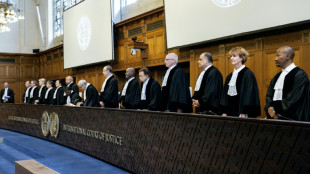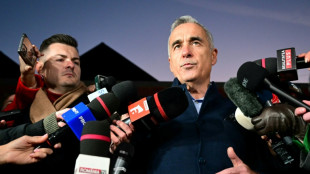
-
 Top UN court to open unprecedented climate hearings
Top UN court to open unprecedented climate hearings
-
European countries that allow assisted dying

-
 British MPs to debate contentious assisted dying law
British MPs to debate contentious assisted dying law
-
Schmidt not expecting hero's welcome on Ireland return

-
 PSG stuck between domestic dominance and Champions League woes
PSG stuck between domestic dominance and Champions League woes
-
'Hot fight' as unbeaten Bayern visit Dortmund fortress

-
 Bordeaux-Begles' Samu 'not finished yet' with Wallabies
Bordeaux-Begles' Samu 'not finished yet' with Wallabies
-
Brook and Pope half-centuries haul England to 174-4 against NZ

-
 Yen rallies on rate hike bets as equity markets swing
Yen rallies on rate hike bets as equity markets swing
-
Ukraine superstar Mahuchikh brings 'good vibes' to her war-torn country

-
 PlayStation at 30: How Sony's grey box conquered gaming
PlayStation at 30: How Sony's grey box conquered gaming
-
Saudi Arabia hosts UN talks on drought, desertification

-
 PlayStation: Fun facts to know as Sony's console turns 30
PlayStation: Fun facts to know as Sony's console turns 30
-
Nepal's first transgender candidates run for local office

-
 Father of PlayStation says 'everyone told us we would fail'
Father of PlayStation says 'everyone told us we would fail'
-
Ireland seek to overcome former coach Schmidt's Wallabies

-
 Detroit survive Bears comeback to make it 10 wins in a row
Detroit survive Bears comeback to make it 10 wins in a row
-
Mexican actor Silvia Pinal dead at 93

-
 'Black Friday' deals target inflation-weary US consumers
'Black Friday' deals target inflation-weary US consumers
-
Liverpool look to deepen Man City crisis, Amorim seeks first Premier League win

-
 Police fire rubber bullets, tear gas at Georgia protesters after PM delays EU bid
Police fire rubber bullets, tear gas at Georgia protesters after PM delays EU bid
-
England lose three quick wickets in reply to New Zealand's 348

-
 Social media companies slam Australia's under-16 ban
Social media companies slam Australia's under-16 ban
-
Police fire tear gas at Georgia protesters after PM delays EU bid

-
 Canada watchdog sues Google over 'anti-competitive' ad tech
Canada watchdog sues Google over 'anti-competitive' ad tech
-
Hojlund gives Amorim winning Old Trafford bow, Roma hold Spurs

-
 Amorim wins first Man Utd home game after rollercoaster ride
Amorim wins first Man Utd home game after rollercoaster ride
-
France arrests 26 as South Asian migrant trafficking ring smashed

-
 At least 15 dead, 113 missing, in Uganda landslides
At least 15 dead, 113 missing, in Uganda landslides
-
Netanyahu threatens 'intensive war' if Hezbollah breaches fragile truce

-
 Bilbao join Lazio at Europa League summit, Chelsea cruise in Conference League
Bilbao join Lazio at Europa League summit, Chelsea cruise in Conference League
-
In Lebanon's Tyre returning residents find no water, little power

-
 Protests in Georgia after PM delays EU bid to 2028
Protests in Georgia after PM delays EU bid to 2028
-
Biden slams Trump tariff threats as 'counterproductive'

-
 TikTok tactics shake up politics in Romania
TikTok tactics shake up politics in Romania
-
'He should do comedy' says Norris of Verstappen comments

-
 Americans celebrate Thanksgiving after bitter election
Americans celebrate Thanksgiving after bitter election
-
Flood-hit Spain introduces 'climate leave' for workers

-
 UK's Starmer vows to slash net migration
UK's Starmer vows to slash net migration
-
Recount order, TikTok claims throw Romania election into chaos

-
 Jansen stars for South Africa as Sri Lanka crumble to 42 all out
Jansen stars for South Africa as Sri Lanka crumble to 42 all out
-
Bottas set for Mercedes return as Mick Schumacher quits reserve role

-
 Putin threatens Kyiv with new hypersonic missile
Putin threatens Kyiv with new hypersonic missile
-
Georgia delays EU bid until 2028 amid post-election crisis

-
 French PM announces concession in bid to end budget standoff
French PM announces concession in bid to end budget standoff
-
Guardiola's ingenuity will solve Man City crisis, says Slot

-
 South Africa in control after Sri Lanka crash to 42 all out
South Africa in control after Sri Lanka crash to 42 all out
-
'Nothing left': Flood-hit Spanish town struggles one month on

-
 Israel conducts first strike on Lebanon since ceasefire
Israel conducts first strike on Lebanon since ceasefire
-
'Unrecognisable' Mbappe and Real Madrid hurting after European woes


Italy PM seeks to save Albanian migrant deal amid spat with judges
Italy's hard-right government passed a new law Monday to overcome legal opposition to a migrant deal with Albania, as Prime Minister Giorgia Meloni accused judges of political bias.
The decree, which was adopted at a cabinet meeting late Monday, enshrines in law the government's definition of countries as "safe", which would mean Rome can fast-track applications from asylum seekers from those countries.
The move follows a ruling by Italian judges on Friday against the detention of the first migrants sent for processing in Italian-run centres in Albania.
Rome has said that other European Union countries are interested in its flagship policy as a way of processing asylum requests in countries outside the bloc.
But 12 Bangladesh and Egyptian migrants sent to Albania last week had to leave again after the judges' ruling and were taken to Italy.
The judges pointed to a recent European Court of Justice ruling which stipulates that EU states can only designate whole countries as safe, not parts. Some nations on Italy's list include areas which are not considered safe.
As a general rule, EU law takes precedence over conflicting national laws.
Meloni on Friday slammed the ruling as "prejudiced" and said she had called the cabinet meeting "to approve laws to overcome this obstacle, because I don't think it's up to the judges to say which countries are safe, but the government."
- 'Dangerous' -
The cabinet decree would enter into force immediately, before being made law by parliament, where the government has a majority.
The law states that all parts of the designated countries are safe for all categories of people, disregarding caveats in the government's current directives.
However, the government did exclude three countries -- Cameroon, Colombia and Nigeria -- from its previous list of 22 "safe" countries in order to conform with a recent ruling from the European Court of Justice. The list of countries will be updated annually.
Immigration lawyer Guido Savio told AFP the abrupt change would likely lead to new legal challenges.
Italy has long been on the front line of migrants crossing the Mediterranean from North Africa to Europe and Meloni was elected in 2022 on a pledge to stop the boats.
Her coalition has previously clashed with judges over attempts to limit the work done by charity organisations who rescue migrants at sea.
The row escalated Sunday, with Meloni publishing excerpts on social media of a letter sent by one prosecutor to a group which includes judges.
In it, Marco Patarnello warned that Meloni is "stronger and much more dangerous" than former prime minister Silvio Berlusconi, who faced frequent legal woes and who repeatedly attacked the judiciary.
Right-wing politicians said the letter proved the legal bias against the government.
Critics pointed out however that Meloni did not post the rest of the text, in which Patarnello said "we must not engage in political opposition, but we must defend jurisdiction and the citizens' right to an independent judge".
Across the European Union, individual member states are responsible for drawing up their own "safe" country lists. However, the EU intends eventually to agree on a bloc-wide list, officials say.
M.Furrer--BTB
